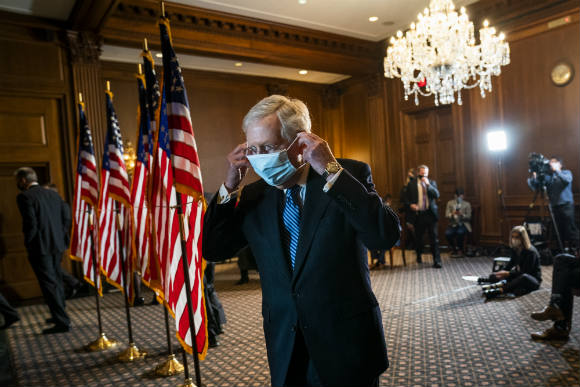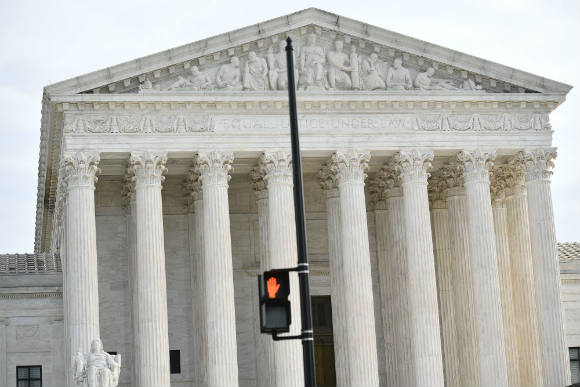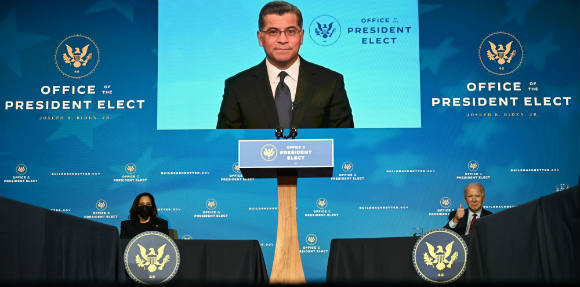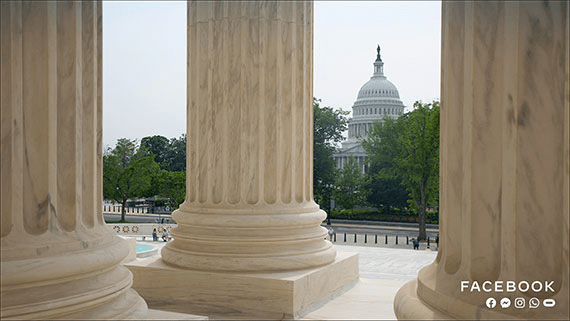The Hill’s Morning Report – Presented by Facebook – House bucks veto threat to approve defense bill as virus relief in limbo
Presented by Facebook

Welcome to The Hill’s Morning Report. It is Wednesday! We get you up to speed on the most important developments in politics and policy, plus trends to watch. Alexis Simendinger and Al Weaver are the co-creators, and readers can find us on Twitter @asimendinger and @alweaver22. Please recommend the Morning Report to friends and let us know what you think. CLICK HERE to subscribe!
Total U.S. coronavirus deaths reported each morning this week: Monday, 282,312; Tuesday, 283,743; Wednesday, 286,325.
Topsy-turvy negotiations on Capitol Hill continued on Tuesday as lead negotiators and the Trump administration arm-wrestled over a coronavirus relief bill, with the hourglass winding down toward lawmakers’ holiday deadline.
Senate Majority Leader Mitch McConnell (R-Ky.) proposed on Tuesday that Republicans and Democrats set aside two of the major sticking points on each side of the aisle in an attempt to forge an agreement by the end of next week. Specifically, McConnell offered to drop his insistence that any bill include liability protections for businesses, schools and other entities but only if Democrats forfeit their insistence on federal help for state and local governments.
“My view, and I think it’s the view shared by literally everybody on both sides of the aisle: We can’t leave without doing a COVID bill. The country needs it,” McConnell told reporters at a Tuesday press conference. “We need to do this. … It remains my view that we ought to pass what we can agree on” (The Hill).
The call landed with a thud on the other side of the aisle, with Senate Minority Leader Charles Schumer (D-N.Y.) blasting the idea shortly after. He said that McConnell was trying to sabotage talks that had appeared last week to pick up steam with the unveiling of a bipartisan proposal. Speaker Nancy Pelosi (D-Calif.) called the Kentucky Republican’s idea “appalling” (The Hill).
McConnell’s idea was soon swamped as the Trump administration waded back into negotiations. Treasury Secretary Steven Mnuchin announced a new $916 billion proposal, which would include funds for state and local governments, liability protections, and direct checks to Americans. The secretary made his pitch directly to Pelosi. According to House Minority Leader Kevin McCarthy (R-Calif.), it includes direct payments of $600 to individuals and $1,200 to couples — half of what the CARES Act provided in late March (The Associated Press).
However, the offer also led to a mixed reaction from the Democratic leaders, who called the bill — which is backed by both McCarthy and McConnell — “progress,” but criticized it because it cuts unemployment insurance from $180 billion in the proposal by bipartisan lawmakers to $40 billion (The Hill). According to The Washington Post, the new round of checks will take the place of unemployment benefits, which Pelosi and Schumer called “unacceptable.”
Leaders on both sides worry they cannot leave town next week without a deal as the pandemic worsens coast to coast. Where things stand this morning is a question mark. Last week, momentum appeared to build behind a $908 billion stimulus proposal crafted by a determined group of bipartisan lawmakers.
“Nobody is driving the train [in the GOP],” said one Senate Republican aide. “Mnuchin has undermined McConnell’s bargaining position for months. Any time [the] left wants something, Mnuchin gives it.”
“But that being said, McConnell has power to control the Senate floor and he’s being motivated by one thing and one thing only: Georgia,” the aide continued, referring to two Senate runoff contests on Jan. 5. “He’s not going to bring anything to the floor that isn’t a messaging winner in Georgia.”
The House is expected to approve a one-week stopgap funding bill later today, with the Senate likely to do so shortly after, giving the two sides just over a week to hammer out a deal that has eluded them for more than four months.
The New York Times: White House offers $916 billion stimulus proposal, cutting jobless benefits.
The Washington Post: Senate stimulus negotiators try to reach a deal on whether companies can be sued over virus outbreaks.
The Hill: President-elect Joe Biden calls on Congress to quickly take action on an aid package.
The Hill: Support grows for stimulus checks, but they may wait.
> NDAA: By a vote of 335-78, a veto-proof majority, the House on Tuesday approved the defense policy bill despite President Trump’s repeated veto threats. Republicans who bucked the president totaled 140. Although many Republicans voted for the bill Tuesday, it’s unclear if they would take the next step to hand him the first override of his presidency.
The vote split House Republican leaders. McCarthy backed the bill, but said he wouldn’t support an override of the president. MInority Whip Steve Scalise (R-La.) opposed the measure while Rep. Liz Cheney (Wyo.), the No.3-ranked Republican, voted for the bill and said she supports an override. The Office of Management and Budget officially notified lawmakers of the veto threat on Tuesday.
The defense authorization measure, which has become law 59 years in a row, is considered must-pass because it includes dozens of special pay and bonuses for service members as well as military construction projects and training programs. Trump’s objections are considered largely extraneous to the bill’s provisions. The Senate is expected to vote later in the week on the package (The Hill).

A MESSAGE FROM FACEBOOK
Facebook supports updated internet regulations
We support updated internet regulations to set clear rules for today’s toughest challenges and hold companies, including Facebook, accountable for:
— Combating foreign election interference
— Protecting people’s privacy
— Enabling safe and easy data portability between platforms
LEADING THE DAY
CORONAVIRUS: As the number of confirmed U.S. cases of COVID-19 surpassed 15 million on Tuesday, Americans let their minds race ahead to a future with vaccine cures tumbling off pharmaceutical conveyor belts and into the arms of patiently waiting Americans.
The optimism came from the White House and Trump, from the president-elect and his newly introduced virus-fighting team in Wilmington, Del., and from U.S. regulators, who encouraged the idea that a COVID-19 vaccine developed by Pfizer (pictured below) was poised for distribution in this country. The Food and Drug Administration’s (FDA) independent advisers on Thursday will debate if evidence is strong enough to recommend vaccinating millions of eager Americans in the largest inoculation effort in the nation’s history. A final FDA decision and the first shots could follow almost immediately (The Associated Press and The New York Times).
Reuters: Pfizer Inc. cleared a hurdle in the race to get its COVID-19 vaccine approved for emergency use on Tuesday after the FDA released documents that raised no new issues about its safety or efficacy.
Pfizer CEO Albert Bourla says he’s confident his company will get a nod from the U.S. advisory panel for the company’s COVID-19 experimental vaccine (Reuters).
But beyond the relief and applause for what seems to be a miraculously rapid breakthrough to battle a coronavirus in global circulation for just a year, there are questions about where the United States will obtain enough doses to establish immunity and let commerce resume and put students back in classrooms.
AstraZeneca and Oxford University have more work to do to confirm whether their COVID-19 vaccine can be 90 percent effective, peer-reviewed data published in The Lancet showed on Tuesday, potentially slowing its eventual rollout in the fight against the pandemic (Reuters).
The Hill: The administration is relying on vaccine developers in addition to Pfizer, fueling concerns that the United States may not have enough doses to meet its goal of vaccinating the entire U.S. population by the spring or summer of 2021. Former FDA Commissioner Scott Gottlieb, a member of the Pfizer board of directors, said Tuesday that Pfizer previously offered the Trump administration the chance to buy additional doses of its coronavirus vaccine multiple times but that the administration turned down the offers.
Global demand for COVID-19 testing and diagnostic devices is expected to outstrip supply for a long time, Swiss company Roche CEO Severin Schwan said on Tuesday. “We still have little information about duration and efficacy of vaccines … so diagnostics will remain very important, not only for the months to come but the years to come,” he said (Reuters).
> International cures: A Chinese vaccine is 86 percent effective, according to the United Arab Emirates, where clinical trials were held. The available data represent a political and scientific win for China, which has three other vaccine candidates in late-stage trials (The New York Times). … In Russia, vaccines against COVID-19 are free, but mistrust is high (The New York Times).
The deadliest month of the pandemic in this country may be building: The first signs of a post-Thanksgiving surge in coronavirus cases are beginning to show up in data released by states. Those hints of an uptick in case counts come as the country faces an already substantial wave of infections that began in the Upper Midwest and spread to every corner of the map as summer turned to fall and the weather cooled (The Hill).
Infections: Trump lawyer Jenna Ellis tested positive for COVID-19, she told associates. She attended a White House Christmas party for senior staff members on Friday (Axios). Rudy Giuliani, who is recovering from COVID-19 after being hospitalized, confirmed on Twitter that Ellis contracted the virus. He continues to argue that his client won the election.
Trump on Tuesday defended the White House decision to hold a series of indoor Christmas parties for friends and administration personnel this year, despite federal and D.C. guidance to limit large indoor groups to try to mitigate virus spread. “Frankly, we’ve reduced the number very substantially, as you know,” Trump said of the holiday events, which also place White House residence staff and military aides at risk for exposure. “I see a lot of people at the parties wearing masks, and I think that’s a good thing.”
State Watch: North Carolina Gov. Roy Cooper (D) orders residents to stay home between 10 p.m. and 5 a.m. (The Hill). … Maryland Gov. Larry Hogan (R) said on Tuesday that the first 155,000 vaccine doses allocated to his state will include 50,700 doses of the Pfizer version. The state expects distribution to begin next week. Distribution of another 104,300 vaccine doses, which will be of Moderna’s version, is expected to begin the following week. “The cavalry is coming,” the governor said (WTOP).

****
POLITICS: The Supreme Court on Tuesday rejected a bid by Republicans to nullify Biden’s victory in Pennsylvania, dealing another blow to the flailing legal effort by Trump and his allies to overturn the election in the courts.
The Tuesday order, which was unsigned and included no noted dissents, came ahead of the midnight “safe harbor” deadline, which provides states a kind of immunity from congressional oversight into election results that are certified in time. The justices’ move leaves intact Biden’s victory of 81,000 votes.
It also represents the latest in a lengthy string of defeats for Trump and his allies amid their increasingly implausible legal campaign, which is largely premised on unsupported claims of widespread fraud (The Hill).
Nevertheless, Texas filed suit on Tuesday directly to the Supreme Court against Georgia, Michigan, Pennsylvania and Wisconsin in an attempt to help Trump overturn the election. To argue Texas has standing, the Republican-governed state accused election officials in the four states of failing to protect mail-in voting from fraud, thus diminishing “the weight of votes cast in states that lawfully abide by the election structure set forth in the Constitution” (Reuters).
The New York Times: As Trump rails against loss, his supporters become more threatening.
The Associated Press: Tuesday’s safe harbor deadline was a boost for Biden.
The Hill: Georgia elections official: Trump should ”’act more responsibly.”
The Hill: Jaime Harrison seen as front-runner to take over DNC at crucial moment.

IN FOCUS/SHARP TAKES
NEW ADMINISTRATION: Biden will nominate Rep. Marcia Fudge (D-Ohio), to lead the Housing and Urban Affairs Department, and he tapped Tom Vilsack, an eight-year veteran as secretary of Agriculture, to return to that role (NBC News). The choice of Vilsack reawakens rifts between some agriculture groups and progressive Democrats, who fear the former Iowa governor is too close to corporate agriculture interests (The Hill).
After introducing members of his new health and coronavirus management team, Biden on Tuesday added to his virus battle plan with a promise to get “at least 100 million COVID vaccine shots into the arms of the American people” by late April. He also said he favors a “national priority” to get children back to school during his first 100 days (The New York Times).
The Hill’s Brett Samuels reports that Biden’s outlook on Tuesday contrasted with that of Trump, who again insisted at the White House that he won the election. Trump closed an event about COVID-19 vaccines by telling reporters that “hopefully the next administration will be the Trump administration.”
Biden’s health policy appointees and nominees to date:
California Attorney General Xavier Becerra is Biden’s choice for secretary of Health and Human Services. If confirmed, he would be the first Latino to lead the department. Becerra is running into early opposition from Senate Republicans, reports The Hill’s Alexander Bolton. Sen. John Cornyn (R-Texas) called the former House member “radical” on Monday, and other GOP lawmakers say he lacks career health sector experience. They argue that during a pandemic, a nominee known more for his political skills is a tough sell.
Vivek Murthy will be nominated to be U.S. surgeon general, a role he filled during the Obama administration.
Rochelle Walensky, a physician and leading expert on virus testing, prevention and treatment, is to be nominated to serve as director of the Centers for Disease Control and Prevention. She has never served in the federal government.
Marcella Nunez-Smith, one of the country’s authorities on health care disparities, will serve as the COVID-19 equity task force chairwoman.
Anthony Fauci will stay on as director of the National Institute of Allergy and Infectious Diseases and will be Biden’s chief medical adviser on the COVID-19 pandemic.
Jeff Zients, former national economic adviser during the Obama administration, will be White House counselor to Biden and coordinator of the COVID-19 response, and Natalie Quillian will serve as deputy coordinator of the COVID-19 response.
As reported on Tuesday, Biden announced he will nominate former Army Gen. Lloyd Austin, who retired from service in 2016, to be Defense secretary. To serve in the top civilian post so soon after leaving the military, Austin, who would be the Pentagon’s first African American secretary, requires a waiver from Congress. Lawmakers granted Trump the exception when he nominated James Mattis as secretary. Biden will introduce Austin in Wilmington today.
“General Austin … played a crucial role in bringing 150,000 American troops home from the theater of war. Pulling that off took more than just the skill and strategy of a seasoned soldier. It required Austin to practice diplomacy,” Biden wrote in an essay for The Atlantic.
“Austin’s many strengths and his intimate knowledge of the Department of Defense and our government are uniquely matched to the challenges and crises we face. He is the person we need in this moment. … Given the immense and urgent threats and challenges our nation faces, he should be confirmed swiftly,” the president-elect wrote.
> President-elect Kamala Harris on Tuesday said that when it comes to immigration, she’s determined to “right the wrongs of these past four years.” Speaking in pre-taped remarks to a National Immigrant Integration Conference that included representatives from more than 450 organizations, she said, “In our first 100 days, we will send an immigration bill to Congress, reinstate DACA [Deferred Action for Childhood Arrivals], repeal harmful and discriminatory policies like the Muslim ban, and during our administration, we will repeal indiscriminate enforcement policies that tear families apart and make us less safe.”
> Justice Department: Alabama Sen. Doug Jones (D) is the leading contender to be nominated for attorney general. Biden is also considering Judge Merrick Garland of the U.S. Court of Appeals for the District of Columbia, who was denied a seat on the Supreme Court in 2016 by a Republican-led Senate, and Sally Yates, a former deputy attorney general. Jones will be leaving the Senate in January after his bid for re-election failed. He would become the second Alabama senator nominated for attorney general in four years; he was elected to fill the Senate seat once held by the other — Republican Jeff Sessions (NBC News).

The Morning Report is created by journalists Alexis Simendinger and Al Weaver. We want to hear from you! Email: asimendinger@digital-staging.thehill.com and aweaver@digital-staging.thehill.com. We invite you to share The Hill’s reporting and newsletters, and encourage others to SUBSCRIBE!
OPINION
The coronavirus aid package should include stimulus checks, targeted to those who need them most, by The Washington Post editorial board. https://wapo.st/3guaGnC
Vaccines alone are not enough to beat COVID-19, by Sam Fazeli, Bloomberg Opinion. https://bloom.bg/3gqeqX7
A MESSAGE FROM FACEBOOK
It’s time for updated regulations to improve privacy standards
We continue to take action to build privacy into our products and give people the tools to help manage their privacy like Privacy Checkup and Off-Facebook Activity.
But there’s more to do. We support updated internet regulations to improve privacy standards.
WHERE AND WHEN
The House meets at noon for legislative business.
The Senate at 10 a.m. will resume consideration of the nomination of Allen Dickerson to be a member of the Federal Election Commission.
The president has no public events.
Vice President Pence will travel this morning to Cape Canaveral, Fla., to meet with personnel of the 45th space wing and then chair a meeting of the Space Council. Pence returns to Washington this afternoon.
Biden and Harris will separately receive the President’s Daily Brief. Later they will introduce Austin, their nominee to lead the Pentagon.
INVITATION: The Hill Virtually Live on Thursday at 1 p.m. hosts “Doing Better in America.” As COVID-19 cases continue to surge, Americans are being forced to innovate. Across the nation, small-business owners and educators are leveraging new and creative ways of thinking to stay afloat in tough times. Among those joining the discussion will be Rep. Steve Chabot (R-Ohio), ranking member of the House Small Business Committee, and American Federation of Teachers President Randi Weingarten. RSVP HERE.
The Ronald Reagan Presidential Foundation and Institute hosts “U.S. Foreign Policy in 2021 and Beyond: A Conversation with Rep. Liz Cheney (R-Wyo.)” at noon ET. It will be live streamed HERE.
Hill.TV’s “Rising” program features news and interviews at http://digital-staging.thehill.com/hilltv or on YouTube at 10:30 a.m. EST at Rising on YouTube.
ELSEWHERE
➔ U.S. ARMY: Army Secretary Ryan McCarthy on Tuesday fired or suspended 14 Fort Hood, Texas, officers and enlisted soldiers over violence at the base that included murder, sexual assault and harassment. The administrative actions are expected to trigger investigations that could lead to a wide range of punishments that could go from a simple letter of reprimand to a military discharge. So far this year, 25 soldiers assigned to Fort Hood have died due to suicide, homicide or accidents, compared with 32 last year and 24 in 2018 (The Associated Press and The Hill).
➔ CYBERSECURITY: U.S.-based FireEye Inc., one of the world’s largest cybersecurity firms, was hacked in what it said was a highly sophisticated foreign government attack that compromised its software tools used to test the defenses of its thousands of customers. The company said the attacker also accessed some internal systems and primarily sought information about government clients (The Wall Street Journal).
➔ IRRATIONAL EXUBERANCE? There are worries in the United States that stocks as the year ends could be more vulnerable to any bad news, such as unexpected setbacks in the pandemic or delays in additional relief spending out of Washington. Investors have lowered cash reserves and poured money into stocks following breakthroughs on COVID-19 vaccines, expectations of more fiscal stimulus and less uncertainty about the U.S. presidential election. Some market analysts believe high stock-price valuations could be a warning sign (Reuters analysis).
THE CLOSER
And finally … In a tale of habitat vs. das fahrzeug, hibernating snakes are complicating Elon Musk’s plans for a gigafactory near Berlin. A German court has told the U.S. billionaire’s electric vehicle company, Tesla, to suspend clearing of a forest at the site of the proposed factory after environmentalists said that cutting down more trees could endanger hibernating snakes. “The Landesumweltamt [state environmental authority] and Tesla will now be consulted, they need to make submissions by this afternoon and then we assess the situation,” a spokesman for the administrative court in Frankfurt an der Oder in eastern Germany said on Tuesday. Tesla declined to comment (Reuters).

–Updated at 7:06 a.m.
Copyright 2024 Nexstar Media Inc. All rights reserved. This material may not be published, broadcast, rewritten, or redistributed..









